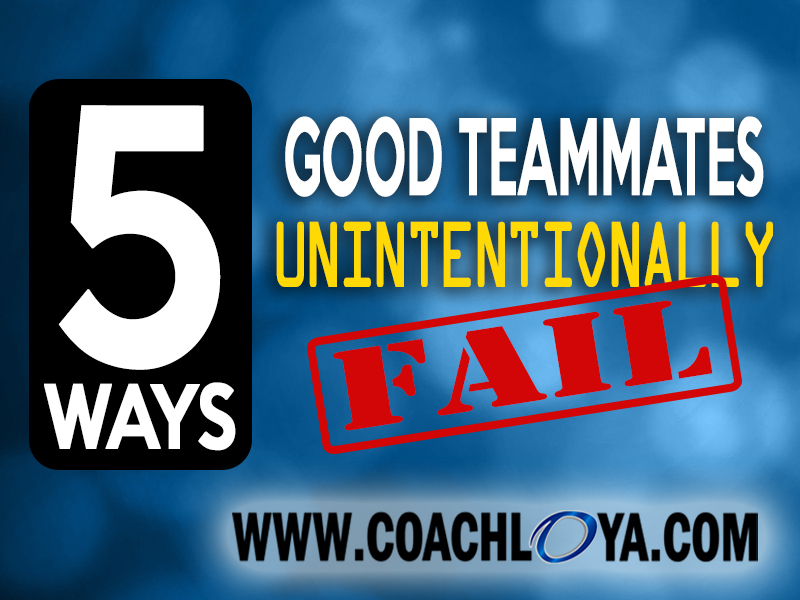Being a good teammate isn’t always easy. You try your best to put the needs of the team before your own, but sometimes your efforts to do that end up causing more harm than good. Here are five ways you can unintentionally fail in your attempt to be a good teammate:
1. Enable: Helping your teammate is great until your help becomes counterproductive. When you start doing tasks for your teammate that he could and should be doing for himself, you do your teammate a disservice. You become an enabler. While your willingness to help is commendable, be sure you aren’t facilitating your teammate’s self-destructive behavior or encouraging his ineptitude. Enablers unintentionally foster team toxicity.
2. Oblige: Similar to the enabler, an obliger’s desire to help is commendable. But if you become too accommodating, trying to oblige every request, you risk burning yourself out. A burnt-out teammate cannot effectively serve the needs of the team—ergo, a burnt-out teammate cannot be a good teammate. You must be able to prioritize your teams and decline opportunities that jeopardize your mental or physical wellbeing.
3. Lack Awareness: Do any of your teammates have annoying habits? Well, you probably do too! Good teammates tend to have a high tolerance for their teammates’ annoying idiosyncrasies like talking loud, chewing with their mouth open, or biting their fingernails. But just because you are tolerant of others’ idiosyncrasies doesn’t mean they will respond the same way towards yours. Good teammates don’t make this assumption. Good teammates are mindful of their annoying habits and make a deliberate effort to avoid engaging in them. Incidentally, being too tolerant of your teammates’ annoying idiosyncrasies cultivates dysfunction and turns you into an enabler.
4. Be Stubborn: Not every issue is worth digging your heels in and preparing for battle. Good teammates know the difference between a preference and a necessity. For example, let’s say your teammate wants to workout before going home. But you want to go home, get something to eat, and workout later. Your way makes more sense. You’ve had a long day and you’re already tired. Why not wait until later when you are fresh and can give a more concentrated effort? Working out later is a preference, not a necessity. Your teammate wanting to workout before going home is also a preference and not a necessity. The issue doesn’t have any deadlines or severe consequences, only a preferred methodology. Good teammates understand the difference between a preference and a necessity. They save their energy for battles over necessities. When it comes to disagreements over preferences, a good policy to abide by is to go with the method of the person to whom it matters more. If doing something a particular way is more important to the other person, then adopt a Frozen Mindset and do it their way. Don’t let your stubbornness turn you into a teambuster.
5. Complain Instead of Confront: You’ve got a problem on your team that you want to remedy. The problem is legitimate and so is your desire to resolve it. You decide to raise awareness and talk about the problem to anybody who will listen. The wheel that squeaks the loudest gets the oil, right? Wrong. The issue is that not everybody who’s willing to listen can do something about your problem. By talking about the problem with unfocused precision, you’ve transformed yourself into a complainer. Complaining could cause you to be a greater source of toxicity than the problem you were originally complaining about. You don’t want to complain about the problem, you want to confront the problem. Confronting means addressing the problem directly to the source or to someone who is in a position to influence the source, like a supervisor. Remember: The wheel that squeaks the loudest doesn’t always get the oil. Sometimes it simply gets replaced.
As always…Good teammates care. Good teammates share. Good teammates listen. Go be a good teammate.





